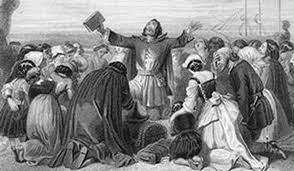A PURITAN PERSPECTIVE ON PREACHING
Below is an article submitted by Dr. Garry E. Milley. Former Professor of Church History and Theology and currently lead Pastor at Church in the Oaks. Enjoy.
A PURITAN PERSPECTIVE ON PREACHING
BY
Garry E. Milley
Preaching is the chief task of the minister for it is the supreme method of awakening faith in those who hear. Preaching is a timeless technique. It is never out of date. Even in our digital age the spoken word still has the power to change lives. Those who aspire to the pulpit be humble and wise enough to learn from the learned how rightly to use such power.
RICHARD BAXTER: OLD MOLD FOR NEW MODELS
One such learned preacher was Richard Baxter, that seventeenth- century Puritan, who had many profound things to say to prospective pastors. He was a master preacher and provides a pattern and philosophy of preaching worthy of note.
The popular preaching of his day consisted of complex rhetoric, obscure thought, and the exhibitionism of human wisdom. Baxter said: “Painted obscure sermons, like painted glass in the windows that keeps out light, are too often the marks of painted hypocrites.” The coloured glass may please the senses but the room is not clearly lighted by it. For Baxter, to hinder the plain rays of God’s Word by unnecessary multi-coloured embellishment was a sure way for preachers to cause fools to admire their intelligence and wise to mock their ignorance.
A Christmas sermon preached in 1624 by John Donne, Dean of St. Paul’s, London, provides us with a negative example. In commenting on Isaiah 7:14, “ Behold a virgin shall conceive” Donne waxed eloquent in the following manner:
If I lacke a signe, I seeke no other but this, That God was made man for me; which the Church and Churchwriters, have well expressed by the Word Incarnation, for that acknowledges, and denotes, that God was made my flesh: It were not so strange, that he who is spirit, should be made my spirit, my soule, but he was made my flesh: Therefore have the Fathers delighted themselves, in the variation of that word; so far, as that Hilarie cals it Corporationem, That God assumed my Body; And Damascen cals it Inhumanationem, That God became this man, soule and body; And Irenaeus cal it Adunationem, and Nysen Contemperationem, A mingling, says one, an uniting, sais the other, of two, of God and man, in one person. (Original spelling retained).
Eloquent words? To be sure! But they serve only to alienate common people from the dynamic truth of the Word of God.
Before the changes brought about by the seventeenth-century Puritan movement, the English people were spiritually undernourished because of a lack of evangelical preaching. The popular piety of the times still centered around the sacraments although significant advancement of Protestant ideas had occurred during the reign of Elizabeth 1 (1558-1603). The clergy, by and large, were unskilled in biblical exegesis and expository preaching. Even where sermons were abundant, the doctrinal content was below the standards of the Puritans who used the measure of the plain meaning of Scripture as their plumb line.
The plain meaning of Scripture was a blessing made available through the efforts of men like William Tyndale and Miles Coverdale who gave the English people the Bible in their own language. The appearance of the English Bible gradually brought about the dramatic re-centering of piety from the sacraments to the Scripture. Among the Puritans, the work of the ministry became less of the priest at the altar and more of the preacher in the pulpit.
English Protestants are indebted to the Puritans for the rediscovery of a Bible-centered preaching ministry that sought to remove God’s Word from the obscurity of an impenetrable scholasticism. The Puritans were concerned that preaching be plain, practical and prepared.
PREACHING MUST BE PLAIN
In his celebrated book The Reformed Pastor, Richard Baxter stated that there was no better way of making the good cause of the Gospel prevail, “than to make it as plain and as thoroughly known as possible.” Simplicity and clarity were indispensable in the proclamation of the faith.
Plain preaching avoided vague concepts and the kind of rhetoric that left people baffled as to the meaning of Scripture. The purpose of preaching was to make God’s message understood, and the Puritan pastor knew that “he must speak to the capacity of his hearers.” Truth is useless unless it is made clear. If truth doesn’t come to the light it remains in darkness! Baxter admonished the pastors of his day to teach the truth plainly. “If you do not wish to teach men the truth, what business do you have in the pulpit? If you want to teach them, then why do you not speak so as to be understood?”
Plain preaching did not mean dull and dreary preaching. It was preaching that took many illustrations from the common life of the people and gave the sermon that local colour which always appeals to the interests of congregations. Simple words can open the vast treasury of holy writ. John Flavel, a Puritan contemporary of Baxter, taught “Words are but servants to matter. An iron key fitted to the lock, is more useful than a golden key that will not open the door to the treasures. Prudence will cast away a thousand words for one that is apt to penetrate the conscience and reach the heart.”
The use of simple words in Puritan preaching did not result in simplistic sermons. There was no attempt to keep the level of Bible knowledge in the pew at an elementary stage. To listen to the plain preaching of the Puritans was to receive an education in the deep truths of doctrine and devotion.
PREACHING MUST BE PRACTICAL
Puritan preaching was not only plain but also practical. Preaching was not really preaching unless it moved the heart, melted the conscience, and motivated the will to action. Baxter was troubled about “the minister who has such excellent doctrine in his sermon, but no lively and forceful application. Too many preachers speak in such a smooth and uninvolved manner that sleepy sinners are not disturbed enough to listen.” He considered it a form of contempt to preach great, meaningful and important themes without affection and fervency that related the truth to daily life.
Every Puritan sermon ended with an agenda. Sinners were entreated to forsake their sins and to turn to Christ for salvation. Saints were exhorted and urged to press on towards greater height in the faith. Directions for godly living and a plan for the reforming of society were all part of the content of the message. In terms of practical piety the Puritans were unequalled. The contemporary misunderstanding and misuse of the word “puritan” is a sad commentary on how far below them we are in godliness and Christian virtue. A return to plain preaching could help reverse the steady decline of Christian consciousness in our culture.
PREACHING MUST BE PREPARED
Puritan preaching was prepared preaching. Plainness presupposed preparation. If the sermon was unclear, according to Baxter, it was a sign that the preacher had not digested his subject matter. In his day, as in ours, there were some who could not preach plainly because their minds were lazy and unwilling to do prayerful time-consuming study. The Puritans did not despise formal theological education. Some, like John Owen and Thomas Manton, were trained at Oxford. Others, like Thomas Taylor, Jeremiah Burroughs, Thomas Goodwin and William Bridge, spent time at Cambridge, In fact, Emmanuel College, Cambridge was founded to train Puritan preachers.
The Puritans were prayerful in their preparation. Not that they prayed instead of studied. They prayed mostly for the people who would hear the message which had been prayerfully constructed. They knew of no disjunction between the prayer room and the pastor’s study. They were under no delusions. If God was not in the hours of prayer and study, they knew that no amount of gymnastics in the pulpit could force Him to be in the presentation. Baxter frowned upon those lazy pastors who attempted to hide their lack of content by the volume of their voice. He noted, “Some speak loudly and clearly, yet many do not add enough solid matter to what they say, so that their loud voices do but little good.”
Baxter felt “it was no small matter to stand up and face a congregation and deliver a message as from the living God in the name of our redeemer.” He challenged the pastors of his day: “Can anything be more unsuitable than this, a minister who is superficial and dull in the serious and lively business of speaking for God?” He lamented that,
Few men take the pains necessary, to fit them for their further work. Some men have no delight in their studies at all, taking only an hour now and then as an unwelcomed task they are forced to undergo. Should there not be a natural desire to know God and divine things? Should there not be a consciousness of our great ignorance and weakness? Should we not sense the weight of our ministerial work? And will not all this cause us to stick close to our studies, to more diligently seek after truth?
Puritan preaching was plain, practical, and prepared. The Puritan pulpit was a most dangerous foe of the world, the flesh and the devil. The soundness of doctrine, the sincerity of presentation, and the spirituality of the Puritans, gave the preacher a place of great dignity and prominence. Puritans considered preaching a high and holy calling--the chief work of any minister. Pastoral duties were not neglected, but they were second to the proclamation of the Word of God.
The contemporary emphasis on body ministry and lay leadership is an essential part of pastoral ministry. Ministry is more than preaching but the ordained minister must not neglect the best in favour of the very good. In our current efforts to make all laity ministers, we must avoid making all ministers laity. Pastors are ordained to preach and the Puritan stress on preaching, especially from individuals like Richard Baxter, has much to teach us about that joyful and awesome task. We need to pray that God will again raise up many like the Puritan who said, “Let others be Bishops, I will undertake the office of preacher or none at all.”
Suggested Reading
Baxter, Richard. The Reformed Pastor. Richmond: John Knox Press, 1956
Dargan, E.C. The History of Preaching. Grand Rapids: Baker Book House, 1968.
Gill, Theodore, (Editor). The Sermons of John Donne. Meridan Books, n.d.
Lewis, Peter. The Genius of Puritanism. Sussex: Carey Publications, 1975
Stott, John R.W. I Believe in Preaching. London: Hodder and Stoughtton, 1982.




Comments
Post a Comment